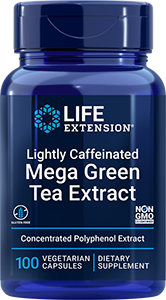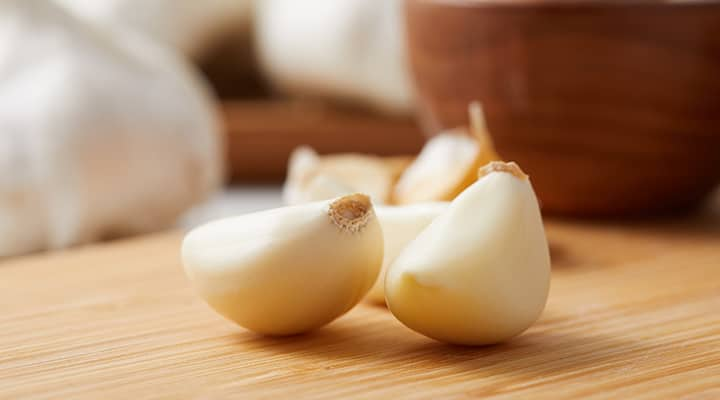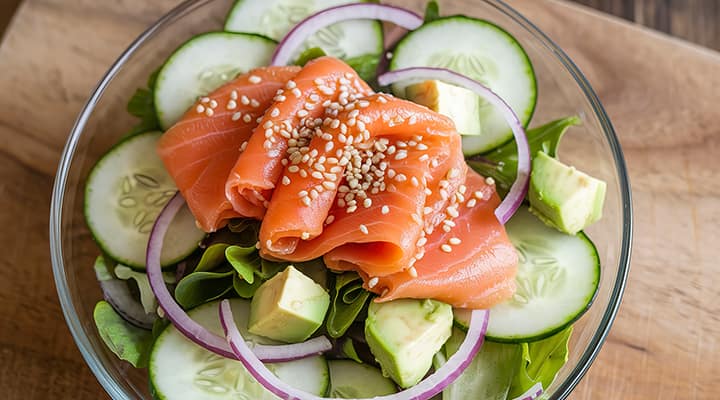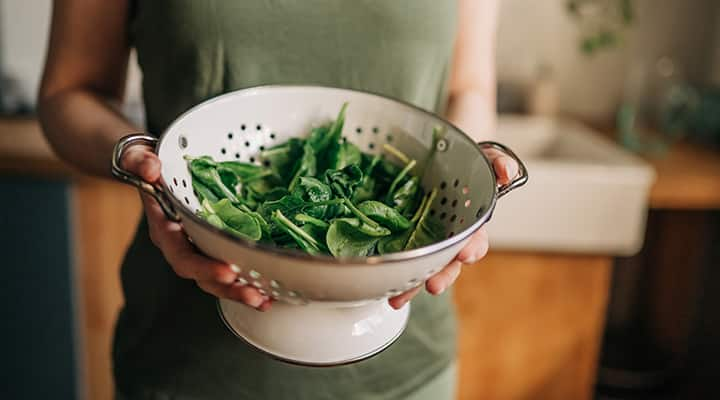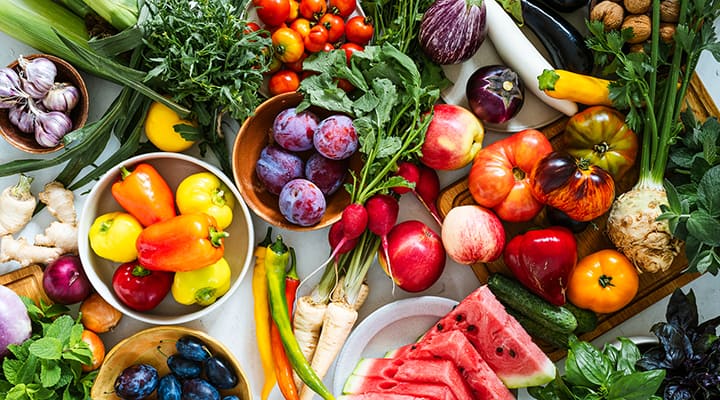
15 Longevity Foods: Healthy Aging Guide
Published: June 2025
Aging isn't just about the years in your life, but the life in your years. And to have more "life" in your years, you'll need to maintain your health status. This is known as "healthspan," or the period of life spent in good health.
The good news is that there are many foods that can increase your healthspan, thanks to key nutrients that they contain, whether that's the polyphenols in green tea or the nitric oxide precursor that contributes to spinach's superfood status.
Even better news: by increasing your healthspan, this could increase your lifespan and contribute to your longevity potential.
So if your goal is living a healthier and longer life, consider adding these longevity foods (and drinks) to your eating pattern.
Best foods and beverages for healthy aging
1. Walnuts
Nuts are nutrient-dense foods that offer unsaturated fats, protein, vitamins, fiber, and minerals such as magnesium. Walnuts in particular are a smart choice among nuts when it comes to longevity foods. Ever notice that they look like a brain? Not only do they support cognitive health, but researchers found that a serving of walnuts (1 oz.) supported cardiovascular health and could support a longer lifespan at age 60 (researchers project an additional 1.3 years in women and 1.26 years in men, to be precise) among those who consumed 5 or more servings per week compared to those who did not eat walnuts.
Plus, the study found that even eating half a serving (0.5 oz.) can be beneficial. So whether you choose to add them to your oatmeal or enjoy them on their own, do stock your pantry with these nutritious nuts!
2. Pomegranates
Botanically considered berries, these ruby-red fruits are bursting with benefits! Many of the health benefits from pomegranates can be attributed to their potent antioxidant properties, though they are also a source of vitamins, minerals, and fiber. Interestingly, after digesting two polyphenols found in pomegranates, punicalagins and ellagitannins, a unique molecule known as urolithin A (UA) is formed. Urolithin A may support autophagy, our bodies' way of cleaning out cellular debris that can get in the way of healthy mitochondria function, though more research on the effect of UA in human aging is needed. Healthy cells, healthy you!
From heart health to metabolic health and more, research has shown that all parts of the pomegranate fruit are beneficial. Sprinkle the arils on your salad, drink the juice, or take an extract!
3. Garlic
Garlic isn't just for repelling vampires; it may play a role in warding off the aging process. Because this beloved bulb is a source of a variety of bioactive compounds, including more than 20 polyphenols, it has strong antioxidant properties, helping the body respond to oxidative stress.
Speaking of aging, both aged garlic, or aged "black garlic," and non-aged garlic offer benefits to our health. Thanks in part to allicin, one of the main active compounds in non-aged garlic that is also responsible for its aroma, garlic promotes immune support and cellular detoxification. Garlic is also known for supporting heart health. S-allyl-cysteine (SAC), a derivative of the amino acid cysteine, is a key compound from aged black garlic which helps maintain healthy blood pressure, cholesterol and triglycerides.
4. Green tea
Like all true teas, green tea is derived from the Camellia sinensis plant. While many tea varieties offer benefits to our health, green tea in particular has stood out to researchers in the field of healthy aging. Green tea has next to no calories and macronutrients, yet is high in bioactive nutrients. Among all types of tea, green tea has the highest concentration of EGCG, a polyphenol (antioxidant). Along with research showing that green tea could support a longer lifespan, green tea drinkers may also enjoy a variety of other benefits from this elixir, including healthy cellular activity, metabolic function, cardiovascular and cognitive health.
5. Olive oil
This Mediterranean diet staple is high in monounsaturated fatty acids (MUFA), especially oleic acid, as well as polyphenols including oleuropein and hydroxytyrosol. Many of the health benefits of olive oil are thought to be a result of its polyphenol content, and the antioxidant activity from it.
Monounsaturated fats are known to be beneficial for heart health. The cardiovascular benefits of olive oil include maintaining healthy cholesterol levels, blood pressure, and more! Interestingly, olive oil can also positively influence gene expression. In a large study in U.S. adults, daily olive oil intake was associated with an increased likelihood of living a longer, healthier life.
Pro tip: contrary to popular belief, olive oil can be used for cooking foods at temperatures of 375-400ºF or below.
Characteristics of Longevity Foods
As you go through this list, you may notice a pattern of foods that are rich in polyphenols, which are bioactive compounds found in foods that act as antioxidants in our bodies. Another theme is heart-healthy types of fat and foods that support cardiovascular health. Foods that benefit our major organs such as the heart and liver (those that support detoxification, for example) make a big difference for the long haul.
There are also nutrients that support processes in the body that are known to decline or stop working properly with age, including: the inflammatory cascade, oxidative stress, cellular senescence, and autophagy.
Nutrients can even influence our gene expression (or suppression), which is known as nutrigenomics. Foods that impact these processes, and therefore hallmarks or biomarkers of aging, also make the list.
6. Blueberries
Known for being among the lower-in-sugar fruits, these berries are high in health-promoting antioxidants including anthocyanins and pterostilbene. Wild blueberries in particular have one of the highest amount of antioxidants when compared to other types of blueberries. You can find wild blueberries in the freezer section of your grocery store or as an extract in a dietary supplement. Research shows that blueberries support cardiovascular, metabolic, brain, and cellular health.
Aim for consuming at least 1 cup per day to get the benefits. You can meet this goal by adding frozen blueberries to your smoothie or adding fresh blueberries atop Greek yogurt with a drizzle of honey.
7. Mushrooms
Fungi are our friends! Mushrooms are a source of beta-glucans (fiber), selenium (mineral), and crucial sulfur-containing antioxidants, ergothioneine and glutathione.
Researchers compared the health status of those who included mushrooms in their diets, including those who consumed mushrooms in place of processed meat, to individuals who had low mushroom consumption. The results showed that eating more mushrooms (and less processed meat) may equate to an increased likelihood of living a longer life.
To get the benefits of mushrooms, aim for 4 cups per week of varieties such as porcini, oyster, shiitake, and maitake. You could also replace a daily serving of processed meat with mushrooms (but be sure to make up the protein equivalent elsewhere in your diet), or take a mushroom extract.
8. Salmon
Could a meal of baked salmon add 16 minutes to your life? Yes, according to researchers who investigated the health effects in minutes of healthy life gained or lost of 5,853 foods in the U.S. diet. A large body of evidence suggests that including non-fried seafood in your diet is beneficial for health.
Fish is included on the list of foods for those following eating patterns commonly recommended by experts such as the Mediterranean, DASH, or MIND diets. And wild salmon is among the best fish in the sea! Salmon is a fatty fish (contains omega-3 fatty acid) and is low in environmental contaminants. Salmon is also a source of vitamin D, selenium, iodine, choline, and more.
9. Yogurt
Need another reason to eat this popular fermented food? Researchers looked at high daily intake of yogurt compared with low daily intake and found that daily yogurt consumption was associated with an increase in lifespan and maintenance of heart health. One of the proposed reasons for the finding was the favorable influence of yogurt on gut health, though it is important to note that yogurt varieties will vary greatly not only in the amount of beneficial bacteria it contains, but also its nutritional profile.
Choose yogurt with no added sugars and sweeten it yourself with fruit and a touch of honey. Also, keep an eye on the fat and protein content to ensure it aligns with your health goals.
Explore Our Best Anti-Aging & Longevity Supplements
10. Spinach
I think we can all agree that the heart is a pretty important organ to maintain for the long haul, and spinach may be just the ticket for your ticker. Aside from spinach containing an impressive variety of vitamins and minerals, it also contains nitrates, which is a precursor to nitric oxide. The nitrates found in leafy greens like spinach can support heart health, according to researchers who evaluated effects of a spinach-containing meal and found that even a single nitrate-rich meal containing spinach supported healthy blood pressure and other measures of cardiovascular health.
Honorable mention: beets, which are also a great option to support nitric oxide production.
11. Seaweed
Did you know that Japan has been known to have a high percentage of centenarians (people over 100 years of age) per capita? Seaweed is a staple in the Japanese diet, and researchers who investigated this eating pattern found that adherence to a Japanese diet is associated with a longer life. Other longevity food research has shown that seaweed intake supports healthy blood flow among a Japanese study population.
12. Cruciferous vegetables
Could just over 1 cup of broccoli daily (which is about 91 g) move the needle when it comes to our health? Yes! A study that included a dose-response analysis reveals that a 100 g/day increment of cruciferous vegetables (which also includes cauliflower, Brussels sprouts, watercress and others) was associated a longer lifespan. Isothiocyanates are one of the bioactive phytonutrients found in cruciferous vegetables that researchers attribute to their multiple health benefits. This longevity food group is known to support healthy cell division, healthy DNA, healthy estrogen metabolism, and more.
13. Dark chocolate
If you love chocolate like I do, I know you're excited to see this one on the list! Indeed, choosing 70% dark chocolate or higher with little-to-no added sugar (in other words, we're not talking about candy bars here) can not only be a part of a healthy diet, but may actually be considered a longevity food.
Cacao beans contain phytonutrients including flavanols, which are a rich source of antioxidants. A study on post-menopausal women found that moderate chocolate consumption of 1 to 3 servings per week was associated with a longer lifespan. Sprinkle cacao nibs on your acai bowl, yogurt parfait, and more for texture, taste, and of course, antioxidants.
14. Legumes
More commonly known as beans, the term "legumes" encompasses a variety of nutritious foods, including chickpeas and lentils. Legumes are high in fiber, a source of plant protein, and offer B vitamins, minerals, and phytonutrients. Research has linked higher legume intake with an increase in lifespan, so be sure to include these satiating and surprisingly versatile foods in your meal rotation.
15. Coffee
Daily coffee drinkers, rejoice! Not only does your morning java put some pep in your step, but coffee is also a source of antioxidants like chlorogenic acid and can support healthy blood sugar and liver health. Studies show that moderate coffee consumption (2-4 cups daily) is associated with a longer lifespan.
Interestingly, the time of day that you drink your coffee could make a key difference. A study looking at morning coffee drinkers versus all-day coffee drinkers found that higher intakes of coffee in the morning were associated with a longer lifespan, but not in those with an all-day drinking pattern. So go ahead and enjoy your morning pick-me-up (preferably without added sugar, as it may actually negate some of the benefits).
Does a plant-based diet help with healthy aging?
Yes! As you may have noticed, this list is heavily plant-based. That is because a diet rich in plant foods can help support healthy aging. Plants contain important nutrients, such as phytonutrients. ("Phyto" refers to the Greek word for plant.)
"Plant-based" often refers to a dietary pattern that includes primarily plant foods, which differs from veganism, in which no animal food sources are included. When it comes to choosing longevity foods for healthy aging, a plant-forward approach, or simply adhering to the recommended 5-7 servings of fruit and vegetables daily can go a long way. So no need to put a label on it, but focus on an eating pattern that includes plants with every meal and snack.
How does the Mediterranean diet support healthy aging?
By emphasizing plant foods and limiting red meat, the Mediterranean diet helps ensure a variety of key nutrients that support healthy aging are consumed.
The Mediterranean diet is a healthy dietary pattern that mimics the traditional dietary habits of countries neighboring the Mediterranean Sea. It emphasizes the consumption of plant foods (fruits, vegetables, whole grains, nuts, legumes) and healthy fats such as olive oil.
It's not strictly vegetarian, though. This way of eating includes a moderate intake of poultry, fish, and dairy, and limited intakes of red meat. There is strong evidence that processed red meat is not a good choice for increasing lifespan; however, the evidence for non-processed red meat is mixed. When you do eat meat, choose lean cuts and grassfed meats.
An observational study of adults older than 18 noted that adherence to the Mediterranean diet was associated with an increased lifespan. Another study with elderly participants older than age 65 showed that closer adherence to the Mediterranean diet was associated with prolonged lifespan.
Easy ways to add longevity foods to meals
It's always nice to find new recipes that you enjoy, but you could also add them to your existing meal rotation! The dishes below are easily customizable, so you can add foods like walnuts, blueberries, pomegranates and dark chocolate as toppings or in the mix to:
- Smoothies
- Yogurt
- Smoothie bowls
- Acai bowls
- Chia pudding
- Oatmeal
- Cereal
For the more savory items such as legumes, seaweed, mushrooms, garlic and olive oil, build your own bowl! Start with some whole grains or legumes as carbs and/or greens as a base, layer on your favorite protein, and top with veggies.
Voila! Longevity is served.
References
- Abe S, et al. "Japanese diet and survival time: The Ohsaki Cohort 1994 study." Clin Nutr. January 2020. https://pubmed.ncbi.nlm.nih.gov/30846323/
- Ansary J, et al. "Potential Health Benefit of Garlic Based on Human Intervention Studies: A Brief Overview." Antioxidants (Basel). July 2020. https://pubmed.ncbi.nlm.nih.gov/32679751/
- Ba DM, et al. "Association of mushroom consumption with all-cause and cause-specific mortality among American adults: prospective cohort study findings from NHANES III." Nutr J. April 2021. https://pubmed.ncbi.nlm.nih.gov/33888143/
- Bell L, et al. "The impact of a walnut-rich breakfast on cognitive performance and brain activity throughout the day in healthy young adults: a crossover intervention trial." Food Funct. March 2025. https://pubmed.ncbi.nlm.nih.gov/39924976/
- Bonaccio M, et al. "Mediterranean diet and mortality in the elderly: a prospective cohort study and a meta-analysis." Br J Nutr. October 2018. https://pubmed.ncbi.nlm.nih.gov/30157978/
- Campanella A, et al. "The effect of the Mediterranean Diet on lifespan: a treatment-effect survival analysis of a population-based prospective cohort study in Southern Italy." Int J Epidemiol. March 2021. https://pubmed.ncbi.nlm.nih.gov/33156916/
- Curtis PJ, et al. "Blueberries improve biomarkers of cardiometabolic function in participants with metabolic syndrome-results from a 6-month, double-blind, randomized controlled trial." Am J Clin Nutr. June 2019. https://pubmed.ncbi.nlm.nih.gov/31136659/
- Eghbali S, et al. "Therapeutic Effects of Punica granatum (Pomegranate): An Updated Review of Clinical Trials." J Nutr Metab. November 2021. https://pmc.ncbi.nlm.nih.gov/articles/PMC8595036/
- Farhat G, et al. "Effects of Pomegranate Extract on Inflammatory Markers and Cardiometabolic Risk Factors in Adults Aged 55-70 Years: A Randomised Controlled Parallel Trial." Nutrients. April 2025. https://pubmed.ncbi.nlm.nih.gov/40218993/
- Guasch-Ferré M, et al. "Consumption of Olive Oil and Risk of Total and Cause-Specific Mortality Among U.S. Adults." J Am Coll Cardiol. January 2022. https://pubmed.ncbi.nlm.nih.gov/35027106/
- Henn M, et al. "Coffee Consumption, Additive Use, and Risk of Type 2 Diabetes-Results from 3 Large Prospective United States Cohort Studies." Am J Clin Nutr. March 2025. https://pubmed.ncbi.nlm.nih.gov/39828230/
- Kim Y, et al. "Coffee consumption and all-cause and cause-specific mortality: a meta-analysis by potential modifiers." Eur J Epidemiol. August 2019. https://pubmed.ncbi.nlm.nih.gov/31055709/
- Kuerec AH, et al. "Targeting aging with urolithin A in humans: A systematic review." Ageing Research Reviews. September 2024. https://www.sciencedirect.com/science/article/pii/S1568163724002241
- Larsson SC, Orsini N. "Red meat and processed meat consumption and all-cause mortality: a meta-analysis." Am J Epidemiol. February 2014. https://pubmed.ncbi.nlm.nih.gov/24148709/
- Liu AH, et al. "Effects of a nitrate-rich meal on arterial stiffness and blood pressure in healthy volunteers." Nitric Oxide. November 2013. https://pubmed.ncbi.nlm.nih.gov/24120618/
- Liu J, et al. "Association of green tea consumption with mortality from all-cause, cardiovascular disease and cancer in a Chinese cohort of 165,000 adult men." Eur J Epidemiol. September 2016. https://pubmed.ncbi.nlm.nih.gov/27372743/
- Liu X, et al. "Association of Walnut Consumption with Total and Cause-Specific Mortality and Life Expectancy in U.S. Adults." Nutrients. August 2021. https://pubmed.ncbi.nlm.nih.gov/34444859/
- Lopes CR, Cunha RA. "Impact of coffee intake on human aging: Epidemiology and cellular mechanisms." Ageing Res Rev. December 2024. https://pubmed.ncbi.nlm.nih.gov/39557300/
- Murai U, et al. "Seaweed intake and risk of cardiovascular disease: the Japan Public Health Center-based Prospective (JPHC) Study." Am J Clin Nutr. December 2019. https://pubmed.ncbi.nlm.nih.gov/31518387/
- Pedret A, et al. "Effect of consumption of anthocyanin-rich products on NMR lipoprotein subclasses and biomarkers in hypercholesterolemic subjects: a randomized controlled trial (the AppleCOR study)." Food Funct. March 2025. https://pubmed.ncbi.nlm.nih.gov/39950742/
- Rimm EB, et al. "Seafood Long-Chain n-3 Polyunsaturated Fatty Acids and Cardiovascular Disease: A Science Advisory From the American Heart Association." Circulation. July 2018. https://pubmed.ncbi.nlm.nih.gov/29773586/
- Serreli G, Deiana M. "Extra Virgin Olive Oil Polyphenols: Modulation of Cellular Pathways Related to Oxidant Species and Inflammation in Aging." Cells. February 2020. https://pmc.ncbi.nlm.nih.gov/articles/PMC7072812/
- Stylianou KS, et al. "Small targeted dietary changes can yield substantial gains for human health and the environment." Nat Food. August 2021. https://pubmed.ncbi.nlm.nih.gov/37118177/
- Sun Y, et al. "Chocolate Consumption in Relation to All-Cause and Cause-Specific Mortality in Women: The Women's Health Initiative." J Acad Nutr Diet. June 2023. https://pubmed.ncbi.nlm.nih.gov/36549566/
- Tutunchi H, et al. "Yogurt consumption and risk of mortality from all causes, CVD and cancer: a comprehensive systematic review and dose-response meta-analysis of cohort studies." Public Health Nutr. June 2023. https://pubmed.ncbi.nlm.nih.gov/36349966/
- Wang X, et al. "Coffee drinking timing and mortality in US adults." Eur Heart J. February 2025. https://pubmed.ncbi.nlm.nih.gov/39776171/
- Zargarzadeh N, et al. "Legume Consumption and Risk of All-Cause and Cause-Specific Mortality: A Systematic Review and Dose-Response Meta-Analysis of Prospective Studies." Adv Nutr. January 2023. https://pmc.ncbi.nlm.nih.gov/articles/PMC10103007/
Always be in the know!
Access the latest deals, wellness news, expert health tips & more!

